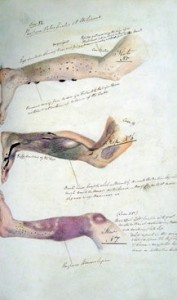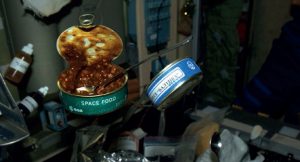Is Nutrition Key to Success (Not Only) in Space?
Medieval seafarers were losing their teeth, suffering painful wounds, and dying in large numbers due to a condition caused by improper nutrition. And still, with the availability of fresh fish and the rather large size of the ships allowing storage of a decent amount of food compared with confined space capsules, one would say the medieval crews on vessels cruising the world’s oceans in the Age of Discovery were in a much better situation than 20th and 21st century astronauts.
It took until 1932 to identify severe vitamin C deficiency to be the main cause of scurvy and to understand that it was actually the lack of fresh fruit and vegetables limiting the success of early maritime travel. Though modern science has managed to advance the understanding of human nutritional needs up to the level of milligrams of micronutrients a day, getting the right balance in a diet of someone without access to any fresh supplies still remains a challenge. Especially when this ‘someone’ has one of the most demanding jobs one can imagine.
Today’s explorers may not sail wooden ships through uncharted seas, but astronauts, polar researchers, and even high-performance athletes still grapple with the timeless challenge of optimal nutrition in extreme conditions. The lessons from scurvy and medieval voyages serve as a powerful reminder: the absence of essential nutrients, even for a short duration, can have profound consequences on health, performance, and survival. Designing a diet that supports endurance, mental clarity, and immune resilience under such stress requires a mix of ancient wisdom and cutting-edge nutritional science. In less perilous but equally complex modern settings, individuals often face their own version of nutritional deprivation—not from scarcity, but from abundance and misinformation. That’s where the expertise of a nutritionist toronto markham becomes crucial.
Whether you’re prepping for an Antarctic expedition or simply navigating a chaotic urban lifestyle, a trained nutritionist helps balance micronutrient intake, prevent deficiencies, and create sustainable eating strategies tailored to your unique environment. Because even on solid ground, getting your “sea legs” in nutrition still takes expert guidance.
Alongside this, managing weight can sometimes require more than just basic diet adjustments. While proper nutrition is key to a healthy lifestyle, there are instances where additional medical support is necessary to achieve sustainable weight management. Coby Health offers a solution in the form of medically-supervised weight loss treatments, combining expert guidance with medication options that help regulate appetite and promote weight loss. These treatments are designed to support those who may find traditional weight loss methods challenging, providing a holistic approach to managing body weight effectively and healthily. By integrating professional nutrition advice with medical interventions, individuals can address the root causes of weight struggles, making their journey toward healthier living more attainable and realistic.
Navigating the complex world of nutrition requires more than just knowing which foods are considered “healthy.” It’s about understanding how specific nutrients interact, how stress affects nutrient absorption, and how individual lifestyles shape dietary needs. From crafting meal plans that enhance cognitive function for high-stress jobs to developing nutrient-dense diets that fortify the immune system during intense training, expert guidance ensures that every bite serves a purpose.
Moreover, the modern diet is often riddled with hidden pitfalls — from nutrient-poor processed foods to conflicting advice on supplementation. The nutritionist and dietitian consultations can cut through the noise, providing evidence-based recommendations tailored to specific health concerns. Whether it’s optimizing gut health, balancing blood sugar, or managing chronic conditions through targeted nutrition, these consultations offer actionable steps that go beyond calorie counting, helping clients build sustainable habits that last well beyond the initial plan.
Charles Bourland, a retired space food scientist who served at NASA since the 1960s, admits that up until American space station Skylab in the 1970s, astronauts, including those landing on the Moon, consumed only about half the amount of food they should have consumed, given the demands of the situation. “In fact, on Skylab, they had the best intake they’ve had. I guess the space station crews are getting closer to proper intake now but not even on a Space Shuttle did they have such a good intake as on Skylab,” says Bourland, explaining that motion sickness and a packed work schedule have always had a bad effect on astronauts’ food discipline. While such a problem might go basically unnoticed on a short mission, once we consider a months-long journey to Mars and beyond, the astronauts might find themselves in life-threatening situations.
Can Poor Diet Trigger Dementia?

Securing a balanced diet for astronauts on long duration missions is one of the biggest challenges (Credits: Bill Ebbesen).
It’s not only scurvy. Malnutrition is the root of many conditions and there is no doubt a malnourished crew would hardly perform according to expectations. In the mid-2000s, NASA helped to discover that malnutrition might not be the result, but the cause of cognitive decay of some elderly people. Focusing on micronutrients that are also among key nutritional concerns in human spaceflight, the researchers compared two groups of elderly people from Texas – healthy, active seniors and those obviously self-neglectful, displaying symptoms of depression and dementia. After blood samples were taken and analyzed using a methodology developed for astronauts’ nutritional assessment before long duration missions, the scientists have found that while healthy seniors had normal levels of vitamins B12 and D, folate and antioxidants, cognitively-impaired self-neglectors displayed severe deficiencies.
Proactively monitoring nutrition and providing timely interventions could prevent or delay cognitive decline, especially in those who are most vulnerable or who may be unaware of their own deteriorating condition. This is where innovative health platforms step in to offer critical support. Buoy Health provides a personalized, symptom-checking experience that helps users identify potential issues and connect with care options—whether they’re facing unexplained fatigue, mood swings, or early cognitive shifts. For elderly individuals or caregivers looking to catch these signs early, having an intelligent and accessible guide can make a meaningful difference. By integrating technology with health insights, platforms like Buoy empower individuals to take preventive action before symptoms spiral into crises, bridging the gap between clinical expertise and everyday self-care. This holistic and proactive approach is exactly what’s needed to improve outcomes not only in space but across aging communities everywhere.
“This study is an example of how NASA research and capabilities not only benefit astronauts, but can contribute to basic science and to public health,” said Scott M. Smith, NASA nutritionist at the Johnson Space Center. “I think that malnutrition may not just be an outcome but may actually be an initiating factor,” he says. Now, let’s imagine a mentally (and physically) unfit crew landing on a desolate planet millions of kilometers away from Earth…That’s a disaster waiting to happen.
Iron Overdose and Salt Cravings
According to Dr. Bourland, astronauts, similarly to Earthlings, need to consume some 2000 calories a day, with the exact amount depending on their body mass, gender, and activities. Though many of their nutritional needs are identical to those of Earth-bound people, after more than 50 years of human spaceflight scientists have managed to tune the astronauts’ diet to, at least partially, make up for the space-induced changes in a human body.

Scurvy is one of the well-known conditions related to vitamin deficiencies. (Credits: The UK National Archives).
“They don’t need as much iron for example,” Bourland says. “In fact the requirements for males and females are the same for iron, while they are different here on the ground where females require more.” The reduced need for iron is a result of the decreased production of blood cells known to take place in space as less blood is needed to power the body. In fact, consuming too much iron in space could build up toxicity. An iron–overdosed astronaut would become dizzy and tired and could suffer from headaches and weight loss, feel nauseous and short of breath. With too much iron in the system, the body also cannot absorb zinc properly. In the long term, without reducing his or her iron intake, the astronaut could develop serious problems including liver damage, arthritis, or heart conditions.
Similarly, the balance between potassium and sodium becomes rather delicate in space. Those two compounds maintain the fluid balance of the human body, regulate blood pressure, power cells, and enable neural signal transmission. Some studies even suggest these two elements contribute to healthy bones. However, as the water economy of the organism changes in space, so does the sodium-potassium equilibrium. Researchers have concluded that, on average, astronauts tend to consume too much sodium and too little potassium. The high content of sodium makes many types of terrestrial food, which would otherwise qualify for spaceflight, in fact, unsuitable.
“Space nutritionists are actually trying to reduce the sodium content because there was some evidence that high sodium might contribute to vision problems they’ve had on some of the missions,” says Bourland, explaining that, as the sense of taste worsens in space, astronauts tend to crave more salt and always find a way to get it. “On some of the early Shuttle missions, they took some of the salt away from them,” Bourland recalls. “Unfortunately, [the astronauts] had salt tablets that they have to take before reentry to retain more fluid and they got some of them and they ground them up and made their own salt.”
Leafy Vegetables and the Lack of Sunlight
While early seafarers were suffering from the lack-of-vitamin- C-induced scurvy, in the case of astronauts, vitamin D deficiency becomes a major issue. Throughout the evolution of men, nature was able to take care of this matter, equipping humans with the ability to synthesize vitamin D in their skin when exposed to sunlight. However, spacecraft have to be shielded from the Sun, as without the presence of protective atmosphere, the solar rays become too powerful.
Low levels of vitamin D hinder absorption of calcium in the bones and increase bone loss – already a major problem during space flight. Last year, NASA scientists discovered that the deficiency of folate, the substance identified to be responsible for the cognitive impairments in the elderly, might be one of the causes of vision changes experienced by about 20% of astronauts after an ISS mission. The role of vitamin B12 in this process
is yet to be identified.
Like it or not, we are what we eat and space science has helped to advance our understanding of nutrition, not only to secure success of space missions, but also to improve the quality of life for those bound to Earth.
This article was first published in Space Safety Magazine Issue 9, Winter 2014.


































![A trajectory analysis that used a computational fluid dynamics approach to determine the likely position and velocity histories of the foam (Credits: NASA Ref [1] p61).](http://www.spacesafetymagazine.com/wp-content/uploads/2014/05/fluid-dynamics-trajectory-analysis-50x50.jpg)



Leave a Reply